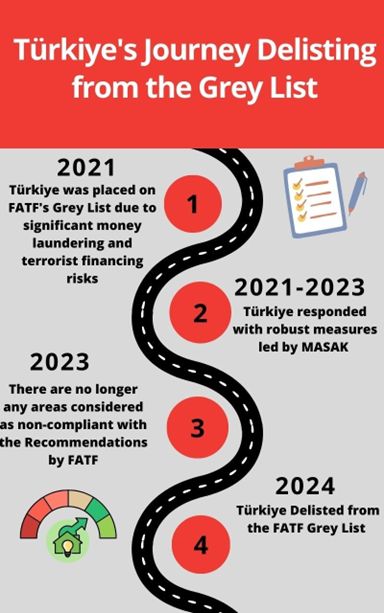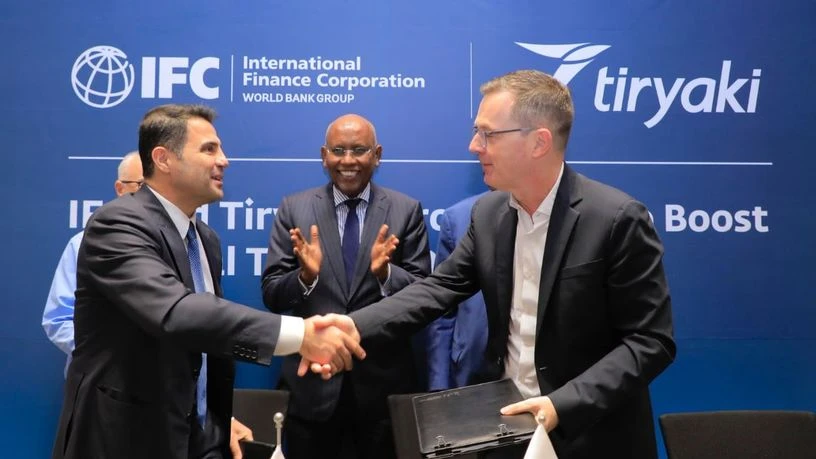Turkey – Money Laundering – Farewell To Grey: The FATF Removes Türkiye From The Grey List
Three years ago, Türkiye was included in the grey list
countries that require special scrutiny of the Financial Action
Task Force (“FATF“). This inclusion
posed significant challenges for Türkiye, as being on the FATF
grey list historically restricts cross-border transactions,
complicates its ability to obtain credit, and limits foreign
investment inflows. The listing underscored concerns regarding
Türkiye’s efforts in combating money laundering and
terrorist financing. However, through intense efforts and
comprehensive reforms of government and stakeholders, Türkiye
has made remarkable progress. These reforms included strengthening
legal frameworks, taking adequate measures to address the concerns,
enhancing oversight mechanisms, and improving international
cooperation. In this regard, Türkiye’s possible delisting
from the grey list has been discussed for a while.

A few days ago, Minister of Treasury and Finance Mehmet
Şimşek travelled to Singapore to participate in the FATF
General Assembly meeting. On June 28, 2024, FATF President Raja
Kumar held a press conference to announce the outcomes of the
General Assembly, revealing that Türkiye has been removed from
the grey list1. According to the Plenary, the
decision-making body of the FATF, Turkey has made significant
progress in strengthening its
AML/CFT regime and is no longer subject to the FATF’s
increased monitoring process. This development reflects
Türkiye’s dedication to aligning with international
standards and enhancing the integrity of its financial system.
In this article, we will discuss the significant outcomes of
Türkiye’s removal from the grey list, delving into the
economic and financial implications of this development. We will
also explore how this achievement is crucial for Türkiye,
particularly in terms of boosting foreign investments and enhancing
international trade.
What are the FATF and the Grey List?
The FATF, an independent international organization established
by the G7 countries in 1989, operates at the OECD headquarters in
Paris2. Initially founded with 16 countries, FATF’s
membership has since expanded to include 37 countries and 2
regional organizations (the European Commission and the Gulf
Cooperation Council), totalling 39 entities. Türkiye has been
a member of the FATF since 19913.
The primary objective of FATF is to assess whether member and
non-member countries have implemented necessary measures against
money laundering and terrorist financing. While FATF assessments
are not legally binding, the organization aims to facilitate
coordinated global intervention to combat organized crime,
corruption, and terrorism. This approach generates a quasi-binding
effect among states, non-member states, and regional organizations,
influencing public opinion and promoting global cooperation.
The FATF 40 Recommendations
(“Recommendations“) are pivotal
documents that establish and promote international standards in
combating money laundering and terrorist financing4. The
Recommendations, set a global standard, which countries should
implement through measures adapted to their particular
circumstances. In this regard, the Recommendations have been
globally accepted as international standards for combating money
laundering and terrorism financing.
Moreover, FATF publishes two lists namely the grey list and the
blacklist. A country’s placement on the black or grey list is
determined by its adherence to these Recommendations. These lists
are updated three times annually. Countries that fail to comply
with the recommendations are placed on the blacklist, while those
showing partial compliance are placed on the grey list. Being
listed signifies that the country has not taken sufficient measures
to combat money laundering and terrorism financing, leading to its
designation as an unreliable country in the international financial
markets.
In detail, countries on the blacklist are identified by FATF as
“jurisdictions subject to a call for action due to
high-risk areas for money laundering, terrorist financing, and
financing of proliferation activities with serious strategic
deficiencies“5. FATF member countries are
called upon to take measures and actions against these countries to
safeguard the international financial system. Currently, the
blacklist includes three countries: Iran, North Korea, and
Myanmar.
On the other hand, the grey list, termed “jurisdictions
under increased (strict) monitoring” identifies countries
actively collaborating with FATF to address strategic deficiencies
in their regimes against the financing of terrorism and
proliferation6. Placing a jurisdiction under increased
monitoring by FATF signifies that the country has committed to
swiftly resolving identified strategic deficiencies within
specified timeframes while being subject to enhanced scrutiny
during this period. Until its removal, Türkiye was on the grey
list along with Bulgaria, Burkina Faso, Cameroon, Croatia, the
Democratic Republic of Congo, Haiti, Jamaica, Kenya, Mali,
Mozambique, Namibia, Nigeria, Philippines, Senegal, South Africa,
South Sudan, Syria, Tanzania, Vietnam, and Yemen7.
However, Türkiye has successfully been delisted from the list
on June 28, 2024.
Türkiye’s Removal from the Grey List
In October 2021, FATF announced Türkiye’s inclusion on
the grey list by publishing the ‘Jurisdictions under
Increased Monitoring‘ list8. According to this
monitoring report, Türkiye was found to be compliant with 11
out of 40 recommendations, largely compliant with 20, partially
compliant with 7, and non-compliant with 29. The FATF
highlighted significant money laundering risks in Türkiye,
attributed primarily to activities such as drug trafficking,
migrant smuggling, human trafficking, and fuel smuggling,
influenced by its geographical location10. Moreover,
FATF underscored significant risks of terrorist financing in
Türkiye, originating from both domestic and international
sources11.
In response to these challenges, the Turkish Financial Crimes
Investigation Board (Mali Suçları
Araştırma Kurulu -
“MASAK“) implemented a series of robust
measures aimed at strengthening the country’s AML/CFT regime
upon thoroughly assessing the Türkiye’s current situation
against the AML/CFT risks. These measures included enhancing the
regulatory framework, increasing the number and quality of
inspections, and providing extensive training for financial
institutions to ensure compliance with international standards.

Following these efforts, FATF released a new report named
“Follow-up Report & Technical Compliance
Re-Rating” (“Follow-Up
Report“) in June 202312. According to the
Follow-Up Report, there are no longer any areas considered as
non-compliant with the Recommendations. Under this Report,
Türkiye was assessed as largely compliant with 25
recommendations and compliant with 14 recommendations. Only one
Recommendation numbered 15 “New Technologies“
was partially compatible. In this regard, Türkiye has taken a
step towards this Recommendation and
regulated crypto assets, which have become very popular as an
investment and payment instrument in recent years, as crypto assets
are favourable for use in money laundering or terrorism
financing.
Minister Mehmet Şimşek played a vital role in this
process. In numerous statements, Şimşek emphasized the
government’s unwavering commitment to addressing the FATF’s
concerns and restoring confidence in Türkiye’s financial
system and stated that Türkiye has “substantially
completed” the necessary steps to be removed from its
grey list. He also highlighted the significant progress made in
recent years, noting that Türkiye had implemented a
comprehensive action plan that addressed all of the
Recommendations.
What’s next: The potential implications of the removal
Removal from the FATF grey list is of great importance,
especially for international reputation and foreign investments.
Being on the grey list had created a perception of higher risk
among international investors, leading them to be cautious and
hesitant to invest in Türkiye.
The removal of Türkiye from the FATF grey list would have
significant implications for the country, particularly in terms of
international investment and economic activities. Concurrently,
many international investment funds are restricted from investing
in countries on the grey list due to legal regulations. As
Türkiye is removed from the grey list, these funds will be
able to invest in Türkiye, potentially increasing foreign
direct investment and stimulating economic growth. Delisting will
increase the investors’ confidence to Turkish market. Indeed,
many investors consider a country’s status on the Grey List
before making investments. Hence, being on the Grey List also a
crucial role in due diligence processes and can sometimes be a
decisive deal breaker. In this sense, this removal could lead to
improved access to capital for businesses operating within
Türkiye, fostering expansion opportunities and job
creation.
Moreover, being on the grey list imposes various restrictions on
cross-border transactions and makes it more challenging to obtain
credit. Financial institutions in grey-listed countries often face
higher scrutiny and stricter compliance requirements, which can
limit their access to international financial networks and increase
transaction costs. Therefore, delisting from the grey list would
alleviate some of these burdens for Turkish businesses and
financial institutions, facilitating smoother cross-border
transactions and potentially reducing borrowing costs.
Another side of the coin, being on the grey list severely
affects a country’s reputation and perception among
international investors and business partners. Indeed, being on the
grey list of the FATF signal concerns about a country’s
commitment to combating money laundering and terrorist financing,
which in turn deters potential investors and affects the overall
business environment. Therefore, removal from the Grey List
demonstrates that Türkiye has implemented adequate measures to
combat money laundering and terrorism financing, significantly
enhancing its international reputation. This milestone reflects the
country’s commitment to financial transparency and regulatory
compliance, restores confidence among foreign investors, and
international partners of its stable and secure financial
environment.
Conclusion
Removal from the Grey List should not be underestimated as a
matter of prestige. It notably positions Türkiye as a
preferred partner in international financial collaborations by
instilling confidence in foreign financial institutions and
investors. Beyond prestige, delisting from the grey list is crucial
for projecting an image of an economy where rules are enforced and
efforts for AML/CFT are effectively managed. Lastly, delisting the
Grey List also signifies the cessation of increased monitoring
process by FATF.
As a result, Türkiye’s delisting from the FATF grey
list marks a significant milestone for the country’s economy
and financial system. The steps taken during this process not only
facilitated Türkiye’s delisting from the grey list but
will also strengthen its financial infrastructure, positioning it
more competitively on the international stage. This milestone not
only signifies Türkiye’s commitment to global financial
standards but also opens new avenues for economic growth and
stability. Moving forward, Türkiye is expected to maintain its
compliance with these standards, supporting the sustainable growth
of its economy.
We wish for the continuation of Türkiye’s progress in
combating money laundering and terrorism financing.
Footnotes
1. FATF,
Last Accessed: 28.06.2024.
2. History of FATF,
, Last Accessed: 28.06.2024.
3. Please see.
4. FATF,
Last Accessed: 27.06.2024.
5. FATF,
Last accessed on 27.06.2024.
6. FATF,
Last accessed on 28.06.2024.
7. FATF,
Last accessed on 28.06.2024.
8. FATF,
Last accessed on 28.06.2024.
9. FATF,
Last accessed on 28.06.2024.
10. FATF,
Last accessed on 26.06.2024.
11. FATF,
Last accessed on 26.06.2024.
12. FATF,
Last Accessed: 27.06.2024.
The content of this article is intended to provide a general
guide to the subject matter. Specialist advice should be sought
about your specific circumstances.


